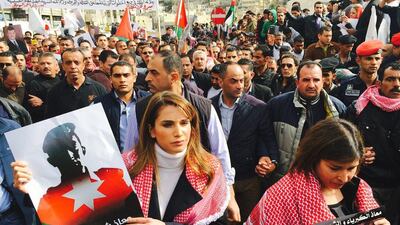AMMAN // Jordan’s Queen Rania joined thousands of people as they marched through the streets of Amman on Friday in a display of unity against the ISIL terror group.
Jordan is experiencing a wave of nationalist fervour following the release of a video showing fighter pilot Maaz Al Kassasbeh being burnt alive.
“We are rallying in support of our king and our army and our hero martyr Maaz,” said Noor bint Ali, a 29-year-old woman who attended the demonstration with a group of friends.
Al Kassasbeh was captured after being forced to eject from his F-16 fighter jet while carrying out US-led coalition attacks on ISIL targets in Syria in December.
Jordan was willing to do a prisoner exchange for the pilot, offering to free Sajida Al Rishawi, a failed suicide bomber on death row whose release ISIL had demanded. On Tuesday, however, the group released a video showing Al Kassasbeh being burnt alive inside a cage.
At first it was unclear if the pilot’s murder would prompt greater domestic opposition to Jordan’s role in the anti-ISIL coalition. Instead, his name appears to have become a rallying cry as his family and other Jordanian citizens push their government to do more to fight the terror group.
After midday prayers on Friday, the marchers set off from the historic Al Husseini Mosque and walked to Palm Square, near the Amman municipality offices.
Queen Rania joined the rally unannounced, walking alongside demonstrators with a red-and-white keffiyeh over her shoulders and holding a poster of Al Kassasbeh.
“Death to Daesh!” the protesters chanted, using an alternative name for ISIL. Others chanted: “We’d rather die than be insulted.”
Hamza Raba’ba, 26, from the northern city of Zarqa, considered a stronghold for extremists in Jordan, said he came with other members of his government-sponsored youth group to show solidarity with Al Kassasbeh’s family and “defend Islam and Arabs” from the damage ISIL was inflicting on their reputation.
“We are angry about what ISIL is doing. They are criminals and terrorists,” he said.
On Wednesday, the government executed Al Rishawi and another militant on death row, Ziad Al Karbouli, in retaliation for Al Kassasbeh’s killing. The next day dozens of Jordanian jets bombed ISIL targets in northern Syria, destroying weapon stashes and training centres, even as officials warned that their response was just beginning.
“We’re upping the ante. We’re going after them wherever they are, with everything that we have,” Jordan’s foreign minister Nasser Judeh said after the attacks.
Amid the calls for a stepped-up role in the fight against ISIL, questions were also raised about how much more the country would be able to respond.
“They have military capabilities that are pretty good and special operations forces, but those can only be part of a bigger effort,” said Rami Khouri, a Middle East expert at the American University of Beirut.
“They can’t do very much on their own and they wouldn’t.”
Late on Friday, ISIL claimed that Jordanian airstrikes in Syria killed an American woman hostage, Kayla Jean Mueller.
The group said on Twitter that the woman was buried beneath the rubble after a raid by a Jordanian warplane in Raqqa, the self-proclaimed capital of the militant group.
The statement did not show any pictures of a body and there was no independent confirmation of her reported death. Mueller’s family had previously asked that her name not be revealed.
Nizar Akrabawi, a 44-year-old lawyer was at yesterday’s demonstration in Amman with his wife and four children.
He wanted to see the air force continue to strike ISIL, but he was concerned about ground troops joining the fight.
“If we go with ground forces we will have bad consequences,” he said. “Jordan will not put itself in such a situation without studying the risks of the whole war.”
While he felt the country now had a greater stake in the war because of Al Kassasbeh’s death, he wanted a careful response from the country’s leadership.
“There might be [ISIL] cells here that can come up and do something bad in Jordan,” he said.
He added that Muslim scholars in Jordan must also “change the way they speak to young people” in schools and mosques, saying that the next generation needed to have a different relationship with religion. “What happened in Syria and Iraq is because of that,” he said, in reference to the speeches of inflammatory imams.
Meanwhile, Abu Mohammad Al Maqdisi, a militant preacher known for being a source of inspiration to Al Qaeda in Iraq – ISIL’s predecessor– criticised the group in an interview on Jordan’s Roya TV.
Al Maqdisi, a Palestinian-Jordanian who was arrested in October, was released the day before.
“They made Islam look like it’s only about killing,” he said, denouncing ISIL for burning Al Kassasbeh to death, saying it was “not acceptable in any religion”.
He also claimed to have been involved in talks to exchange the pilot for Al Rishawi and was incensed that he was lied to by members of ISIL, who had assured him Al Kassasbeh was alive.
The Jordanian government believes the pilot was killed on January 3.
Al Maqdisi said ISIL was ultimately responsible for Al Rishawi’s execution.
jvela@thenational.ae

